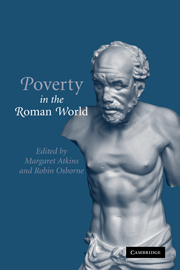Book contents
- Frontmatter
- Contents
- List of contributors
- Preface
- List of abbreviations
- Chapter 1 Introduction: Roman poverty in context
- Chapter 2 The poor in the city of Rome
- Chapter 3 Stratification, deprivation and quality of life
- Chapter 4 ‘You do him no service’: an exploration of pagan almsgiving
- Chapter 5 Writing poverty in Rome
- Chapter 6 Poverty and population in Roman Egypt
- Chapter 7 A pragmatic approach to poverty and riches: Ambrosiaster's quaestio 124
- Chapter 8 Portraying the poor: descriptions of poverty in Christian texts from the late Roman empire
- Chapter 9 Throwing parties for the poor: poverty and splendour in the late antique church
- Chapter 10 Salvian, the ideal Christian community and the fate of the poor in fifth-century Gaul
- Chapter 11 Poverty and Roman law
- Bibliography
- Index
Chapter 5 - Writing poverty in Rome
Published online by Cambridge University Press: 22 September 2009
- Frontmatter
- Contents
- List of contributors
- Preface
- List of abbreviations
- Chapter 1 Introduction: Roman poverty in context
- Chapter 2 The poor in the city of Rome
- Chapter 3 Stratification, deprivation and quality of life
- Chapter 4 ‘You do him no service’: an exploration of pagan almsgiving
- Chapter 5 Writing poverty in Rome
- Chapter 6 Poverty and population in Roman Egypt
- Chapter 7 A pragmatic approach to poverty and riches: Ambrosiaster's quaestio 124
- Chapter 8 Portraying the poor: descriptions of poverty in Christian texts from the late Roman empire
- Chapter 9 Throwing parties for the poor: poverty and splendour in the late antique church
- Chapter 10 Salvian, the ideal Christian community and the fate of the poor in fifth-century Gaul
- Chapter 11 Poverty and Roman law
- Bibliography
- Index
Summary
It is the tenth hour of the Roman day. Business, siesta, bathing are done and now it is dinner, otium following negotium. Mingled with otium the careful performance of social officia as amici groom each other, the host balancing his reciprocal ministrations with his peers, feeding his lesser amici who in turn provide the audience that makes him great. All are ‘friends’, but the polite Latin of friendship and the etiquette of the table allows for subtle differentiations of status, just as each dinner offers the chance or risk of social demotions and promotions, of slights and compliments. The cena, where Roman ethics of patronage and deference met Greek symposiastic ethics of equality and frank-speaking, was a privileged space for such renegotiations. Literary cenae were natural vehicles for comment on these games of status and friendship, and on the culinary and social codes they employed. To modern readers none of the diners were social inferiors in any significant sense. Except for the grandest – and most offensive – banquets dreamed up by the satirists, we imagine a play around relatively slight differentials among men who all owned property, who shared the same educational background and so on.
- Type
- Chapter
- Information
- Poverty in the Roman World , pp. 83 - 99Publisher: Cambridge University PressPrint publication year: 2006
- 27
- Cited by

